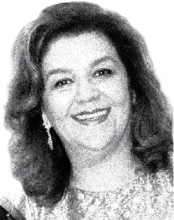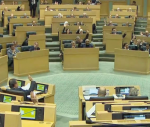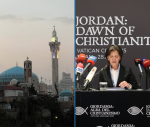You are here
A nation of minorities?
Mar 24,2018 - Last updated at Mar 24,2018
You only have to be slightly more sociable talking to people that are not usually situated in your private and professional bubble to realise that many Jordanians, and regardless of their origin, gender, age, political ideology or religion, feel aggrieved, marginalised and often cite examples of being treated unfairly by the state system, processes or even other citizen categories in a society.
Common wisdom in Jordan had been that if you are a Jordanian Muslim man from an East Bank tribe you are immediately privileged and outside the circle of discriminatory action that might befall other citizens from other origins, gender or religion. All other groups are expected to suffer from a state or societal bias towards them in a context relevant to their situation and current residency status.
But it appears that this measuring yardstick has become somewhat outdated. The niche of the privilege triangle is now pinpointed with an unusually wide base housing multiplicities of Jordan’s quite diverse components of identity, citizenship and residency.
Within that pinpoint, origin disappears as the front line of selection and measure of citizenship/residency and is replaced with access, power and financial clout. In that sense, that group is not unique to Jordan and is in fact similar to any top 1 per cent anywhere in the world.
The challenge remains in the rest of the triangle, where as the economic situation tightens and the diversity of origins exponentially widens with the assimilation of refugees into the social fabric and labour market, more and more Jordanians are identifying their status as unfairly placed within the triangle and therefore a target of biased policies or sentiment.
East bank Jordanian youth feel discriminated against because they feel dismissed as too young to participate in decision making by both the state and their own tribal or clan elders. Young Jordanians of Palestinian origin, lament their exclusion from the public sector and the military, effectively eliminating them from the power brokering mechanisms within the state. Both, for different reasons, feel that they have less opportunity for upward mobility politically, socially or economically and with the influx of Syrian and other refugees, feel squeezed out of the labour market and, therefore, of any credible social status.
Women in those same age and origin categories feel the double jeopardy of their sex and the wrath of a patriarchal system that is keeping them out of public space for fear that they may unsettle the core of the patriarchal power base, which is a family structure that perpetuates and feeds into an archaic socio-economic system of male privilege.
Minority religious and ethnic groups restate and over emphasise their Jordanian identity in the hope that it will erase or at least reduce the bias against their religion-based or ethnic sub identity. They whisper of the bias against them in their own circles, but publicly portray their synergy with the wider more encompassing nationalist and patriotic Jordanian identity so that they may ward off exclusion.
It begs the question: exactly what is missing from the state-prescribed Jordanian identity today that causes the majority of Jordanians to feel trapped in their sub identities and, therefore, anxious and uncertain whether they really are part and parcel of the nation and the state.
The question, reworded, is: how did we become a nation of aggrieved minorities who feel alienated from a supra Jordanian identity?
And I am not referring here to the Jordanian identity as portrayed by the Hashemite regime, historically and until today, which in truth is the most embracing, inclusive and tolerant identity on offer in Jordan.
In fact, it has long been my opinion that it is precisely because the Hashemites have provided this umbrella identity that Jordanians, wherever and whenever there is conflict among sub identities, seek refuge in their “Hashemite identity” rather than a “Jordanian identity” to consolidate their sense of belonging.
What I am referring to here is narrative of exclusion that we have allowed to take hold and is now becoming the common narrative to describe the political scene in Jordan. Whenever we have a question on Jordan’s political structures and systems, we find ourselves automatically pulling out a map of demographics and exclusive pockets of power on the national, regional, community and family levels that we say are unique to Jordan. And then we smile as if we have struck gold.
We fail, however, to talk of the division of power and authority among the real political institutions of the country because we have determined that those are now less significant as influencers or determinants of the citizens’ relationship with the state.
So Parliament is weak and ineffective, the executive authority is a puppet instrument of control, the political parties are family-run businesses, the public sector is bulging and not strategic, the private sector is opportunistic and small, the youth are unskilled, the education system is fraying and the media is either corrupted or unprofessional, etc.
The only survivors of this formula of ineptness, are the security institutions which continue to command the respect of Jordanians for safeguarding Jordan during the years of regional turbulence; and, of course, the Hashemite regime from which it draws its authority and under which it serves. This combination remains the epicentre of the Jordanians’ feeling of stability.
The government today stands confronted on multiple levels: lack of popular support, difficult economic formulas, immature political internal structures and regional/global stressors. Yet, I believe the most challenging of its tasks and the precursor to any success it seeks, and the issue that the government needs foremost to address and articulate is: what does the Jordanian citizen looks like institutionally, legally and politically.
The government must drop once and for all its demographic criteria for citizenship. Inequality, and especially systematic inequality as we see in Jordan today, is the first tool of divisiveness. That is a divisiveness we can no longer afford as a country, especially that there are growing indicators that we are falling into the pitfall of the “minority mindset” and failing to come together, as one cohesive unit, in defence of the country.
At the risk of falling back to clichés, the state would do well to remember that “united we stand, divided we fall”.













